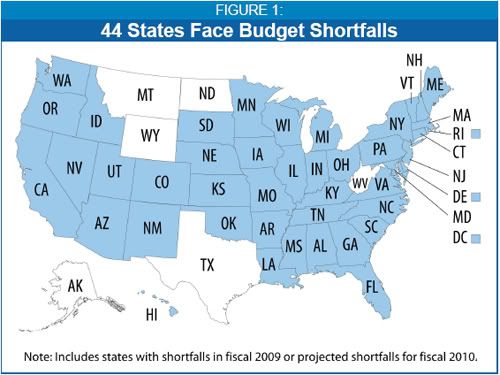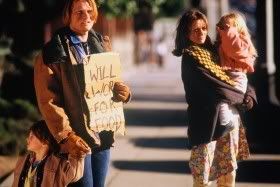( – promoted by buhdydharma )
I’ve written before about what this current recession is doing to state budgets, the “first responders” in delivering whats left of this country’s safety net. But this morning, I read an essay from a very tired social worker at Whiskey Fire that brought it all down to a very personal level.
I have had a ringside seat to the economic downturn this year. It is not an abstraction to me. The folks at the bottom are always the first to feel the pinch, when it comes. Clients of the agency I work at come through our doors every day requesting assistance with basic necessities like food, clothing, shelter and medications. As the year has progressed and New York State has chosen to repeatedly victimize its most vulnerable citizens, it has become more difficult to help people meet these needs. I have visited food banks with empty shelves, been told clients were ineligible for help when I knew they were and had to challenge these decisions. I have sat with clients while their applications for public assistance were reviewed by fraud investigators at social services…
For nearly 30 years we have done our best to dismantle the safety net for the poor and struggling among us. I keep praying that we have reached the end of this folly. At 42, these policies are what I have known my entire work life. I dream about social service programs and rules that would treat people like human beings, rather than as an undesirable applicant to be culled out. I want so badly for us as a nation to stop punishing people for being poor, or elderly or a child of poor people. This holiday season was hellish as I watched scores of our clients navigate the realities of a holiday with nothing but further grinding poverty. Some days I am just weary from the strain of witnessing the suffering that goes on around me. It takes a toll that is more than physical, it eats away at the soul to see people ask for so little and receive far less.
You can feel her weariness, can’t you? We place people like this in a totally untenable situation…trying to help with no resources and having to live with this day after day. I’ve seen the staff where I work become as depressed and immobilized by this kind of thing as the families they work with. And yes, for far too many, their soul eventually dies and they become bureaucrats pushing paper and rules rather than interacting with real human beings…its just too painful.
But frankly, I see no end in sight. From what I’m reading, its just going to get worse. I’ve mentioned before that our Governor Pawlenty has already “unalloted” $428 million in our current fiscal year.
“This is balancing the budget on the backs of the underclass,” Stewart said. “The budget shortfall has to be made up somewhere, but this looks like a worst-case scenario” for agencies that serve the poor.
The New York Times reports that Governor Paterson is proposing a better balance in his state budget reductions, but it still mainly affects the poor.
Education would be particularly hard-hit, with an actual cut of $700 million in state aid in the next fiscal year, not just a reduction in projected spending growth…Tuition at the State University of New York and the City University of New York would also be increased.
Medicaid spending would rise by about 1 percent under the plan, although the projected spending for hospitals, nursing homes and other health care providers would be cut by more than $1 billion.
Gov. David A. Paterson’s spending plan also calls for closing or merging seven smaller state agencies, eliminating property-tax rebate checks, curtailing general municipal aid to New York City and closing 13 prison camps or detention centers…
New York City would be hit hard by the proposal, which would eliminate more than $600 million in general purpose aid over the next two years on top of reductions in education aid.
I found a very helpful article about this as a national issue at the Center on Budget and Policy Priorities. Here’s a map highlighting the 44 states facing shortfalls in their budgets for this and/or next year.

Here’s some of their analysis.
Combined budget gaps for the remainder of this fiscal year and state fiscal years 2010 and 2011 are estimated to total more than $350 billion…
It may be particularly difficult for states to recover from the current fiscal situation. Housing markets may be slow to fully recover; the decline in housing markets has already depressed consumption and sales taxes as people refrain from buying furniture, appliances, construction materials, and the like. Property tax revenues are also affected, and local governments will be looking to states to help address the squeeze on local and education budgets. And as the employment situation continues to deteriorate, income tax revenues will weaken further and there will be further downward pressure on sales tax revenues as consumers are reluctant or unable to spend.
As a new fiscal year begins in most states, budget difficulties are leading some 30 states to reduce services to their residents, including some of their most vulnerable families and individuals.
For example, at least 19 states have implemented or are considering cuts that will affect low-income children’s or families’ eligibility for health insurance or reduce their access to health care services. Programs for the elderly and disabled are also being cut. At least 18 states are cutting medical, rehabilitative, home care, or other services needed by low-income people who are elderly or have disabilities, or significantly increasing the cost of these services.
At least 20 states are cutting or proposing to cut K-12 and early education; several of them are also reducing access to child care and early education, and at least 26 states have implemented or proposed cuts to public colleges and universities.
What isn’t mentioned in this article are the ramifications of these cuts to food shelves, homeless shelters, child protection services, child welfare services, domestic violence programs/shelters and myriad other services that intervene when families are falling through the cracks of our brutal economic system.
As I see it, this is all just getting started. I don’t think we’ve come close to hitting the bottom yet. There are lives on the line here folks. And the only small ray of hope for this situation is a HUGE influx of cash to the states in Obama’s stimulus package. I just hope enough people care.


46 comments
Skip to comment form
Author
but this situation has me worryin.
against what Pawlenty is doing in Minnesota, but this from BarbinMD at Kos is rather faith restoring:
Or faith restoring.
has a 339 dollar a month payment to the poorest of the poor, the absolute outcast, the lost and often homeless, called “general assistance unemployable”. Dear Governor Gregoire is eliminating it in response to the state’s 5 billion dollar budget shortfall, and twenty six thousand people who have nothing will now have less than that.
I wish I had something positive to add in the comments to this diary. Unfortunately, like that very eloquent woman you quoted, at 44 this is what I have seen for my whole life, and public sentiment seems sufficiently hardened that I no longer think there is any degree of suffering which will do much more than harden it further.
But maybe I’m wrong.
… here in NYC that they will raise the subway fare from $2 to $2.50. For me, that wouldn’t be a problem (tho not anything to rejoice about), but I can’t imagine what that will be like for folks who are barely getting by, the working poor, who have to scrape up subway fare to begin with.
I wish that Paterson would allow subsidies for those folks who would be hardest hit by rising transportation costs.
No workhouses? No prisons?
🙁
Author
that Paul Krugman is on this story today.
Report: Military may have to quell domestic violence from economic collapse
“We had to destroy the country in order to save it.”, Anonymous, 2010
Heh, the Republican way to win the War on Poverty.